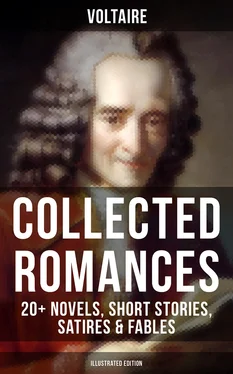"Young man," said the first eunuch, "hast thou seen the queen's dog?"
"It is a bitch," replied Zadig, with great modesty, "and not a dog."
"Thou art in the right," returned the first eunuch.
"It is a very small she-spaniel," added Zadig; "she has lately whelped; she limps on the left fore-foot, and has very long ears."
"Thou hast seen her," said the first eunuch, quite out of breath.
"No," replied Zadig, "I have not seen her, nor did I so much as know that the queen had a bitch."
Exactly at the same time, by one of the common freaks of fortune, the finest horse in the king's stable had escaped from the jockey in the plains of Babylon. The principal huntsman, and all the other officers, ran after him with as much eagerness and anxiety as the first eunuch had done after the bitch. The principal huntsman addressed himself to Zadig, and asked him if he had not seen the king's horse passing by.
"He is the fleetest horse in the king's stable," replied Zadig, "he is five feet high, with very small hoofs, and a tail three feet and an half in length; the studs on his bit are gold, of twenty-three carats, and his shoes are silver of eleven penny-weights."
"What way did he take? where is he?" demanded the chief huntsman.
"I have not seen him," replied Zadig, "and never heard talk of him before."
The principal huntsman and the first eunuch never doubted but that Zadig had stolen the king's horse and the queen's bitch. They therefore had him conducted before the assembly of the grand desterham, who condemned him to the knout, and to spend the rest of his days in Siberia. Hardly was the sentence passed, when the horse and the bitch were both found. The judges were reduced to the disagreeable necessity of reversing their sentence; but they condemned Zadig to pay four hundred ounces of gold for having said that he had not seen what he had seen. This fine he was obliged to pay; after which, he was permitted to plead his cause before the counsel of the grand desterham, when he spoke to the following effect.
"Ye stars of justice, abyss of sciences, mirrors of truth, who have the weight of lead, the hardness of iron, the splendor of the diamond, and many of the properties of gold; since I am permitted to speak before this august assembly, I swear to you by Oromazes, that I have never seen the queen's respectable bitch, nor the sacred horse of the king of kings. The truth of the matter is as follows: I was walking toward the little wood, where I afterward met the venerable eunuch, and the most illustrious chief huntsman. I observed on the sand the traces of an animal, and could easily perceive them to be those of a little dog. The light and long furrows impressed on little eminences of sand between the marks of the paws, plainly discovered that it was a bitch, whose dugs were hanging down, and that therefore she must have whelped a few days before. Other traces of a different kind, that always appeared to have gently brushed the surface of the sand near the marks of the fore-feet, showed me that she had very long ears; and as I remarked that there was always a slighter impression made on the sand by one foot than by the other three, I found that the bitch of our august queen was a little lame, if I may be allowed the expression. With regard to the horse of the king of kings, you will be pleased to know, that walking in the lanes of this wood, I observed the marks of a horse's shoes, all at equal distances. This must be a horse, said I to myself, that gallops excellently. The dust on the trees in a narrow road that was but seven feet wide, was a little brushed off, at the distance of three feet and a half from the middle of the road. This horse, said I, has a tail three feet and a half long, which, being whisked to the right and left, has swept away the dust. I observed under the trees that formed an arbor five feet in height, that the leaves of the branches were newly fallen, from whence I inferred that the horse had touched them, and that he must therefore be five feet high. As to his bit, it must be gold of twenty-three carats, for he had rubbed its bosses against a stone which I knew to be a touchstone, and which I have tried. In a word, from a mark made by his shoes on flints of another kind, I concluded that he was shod with silver eleven deniers fine."
All the judges admired Zadig for his acute and profound discernment. The news of this speech was carried even to the king and queen. Nothing was talked of but Zadig in the anti-chambers, the chambers, and the cabinet; and though many of the magi were of opinion that he ought to be burnt as a sorcerer, the king ordered his officers to restore him the four hundred ounces of gold which he had been obliged to pay. The register, the attorneys, and bailiffs, went to his house with great formality to carry him back his four hundred ounces. They only retained three hundred and ninety-eight of them to defray the expenses of justice; and then their servants demanded their fees.
Zadig saw how extremely dangerous it sometimes is to appear too knowing, and therefore resolved, that on the next occasion of the like nature he would not tell what he had seen.
Such an opportunity soon offered. A prisoner of state made his escape and passed under the windows of Zadig's house. Zadig was examined and made no answer. But it was proved that he had looked at the prisoner from this window. For this crime he was condemned to pay five hundred ounces of gold; and, according to the polite custom of Babylon, he thanked his judges for their indulgence.
"Great God!" said he to himself, "what a misfortune it is to walk in a wood through which the queen's bitch or the king's horse have passed! how dangerous to look out at a window! and how difficult to be happy in this life!"
Table of Contents
Zadig resolved to comfort himself by philosophy and friendship for the evils he had suffered from fortune. He had in the suburbs of Babylon a house elegantly furnished, in which he assembled all the arts and all the pleasures worthy the pursuit of a gentleman. In the morning his library was open to the learned. In the evening his table was surrounded by good company. But he soon found what very dangerous guests these men of letters are. A warm dispute arose on one of Zoroaster's laws, which forbids the eating of a griffin.
"Why," said some of them, "prohibit the eating of a griffin, if there is no such animal in nature?"
"There must necessarily be such an animal," said the others, "since Zoroaster forbids us to eat it."
Zadig would fain have reconciled them by saying:
"If there are no griffins, we cannot possibly eat them; and thus either way we shall obey Zoroaster."
A learned man, who had composed thirteen volumes on the properties of the griffin, and was besides the chief theurgite, hasted away to accuse Zadig before one of the principal magi, named Yebor, the greatest blockhead, and therefore the greatest fanatic among the Chaldeans. This man would have empaled Zadig to do honor to the sun, and would then have recited the breviary of Zoroaster with greater satisfaction. The friend Cador (a friend is better than a hundred priests) went to Yebor, and said to him:
"Long live the sun and the griffins; beware of punishing Zadig; he is a saint; he has griffins in his inner court, and does not eat them; and his accuser is an heretic, who dares to maintain that rabbits have cloven feet, and are not unclean."
"Well," said Yebor, shaking his bald pate, "we must empale Zadig for having thought contemptuously of griffins, and the other party for having spoken disrespectfully of rabbits."
Cador hushed up the affair by appealing to a person who had great interest in the college of the magi. Nobody was empaled. This lenity occasioned a great murmuring among some of the doctors, who from thence predicted the fall of Babylon.
Читать дальше












